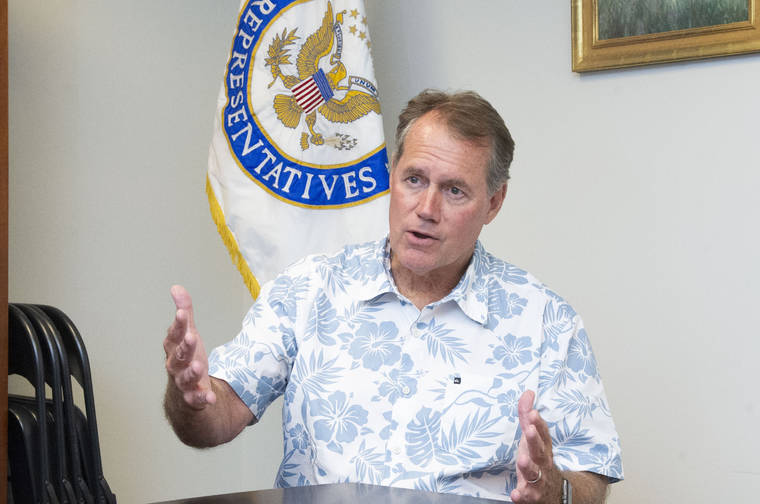As Hawaii struggles to pull its battered economy back from the brink of the ongoing COVID-19 disaster, voters may be counting on their elected leaders in Congress to push hard for relief for ailing local governments, businesses and workers in a state with some of the highest unemployment in the nation.
Yet despite the heightened atmosphere, the 2020 election for Hawaii’s two seats in the U.S. House of Representatives would appear to lack any real drama.
For Hawaii’s 1st Congressional District, comprising urban Honolulu, incumbent Rep. Ed Case, a Democrat, faces no opposition from his party’s ranks in the Aug. 8 primary election. Meanwhile, five Republicans — none with any real name recognition — will vie to meet him in the Nov. 3 general election.
Case, 67, likes to tout his experience in the nation’s capital. After a stint in the state House of Representatives from 1994 to 2002, the Hilo-born politician first served in the U.S. House — in the 2nd Congressional District seat — from 2002 to 2007.
After losing his 2006 U.S. Senate campaign, Case returned to the private sector before seeking the 1st Congressional seat vacated in the 2018 election by Colleen Hanabusa, who ran for governor against the incumbent David Ige.
Case easily beat Republican Cam Cavasso in the general election, with 70% of the vote.
“We are a small state in a very big country,” Case said in a phone interview. “I’ve always thought that a member of Congress from Hawaii really has to pull above his or her weight because there’s only four of us — two in the House and two in the Senate out of 535 (congressional members) — so you have to know what you’re doing.”
Case said his primary focus if re-elected will be on the economic effects of COVID-19. He also supports police and immigration reform and bolstering the U.S. military in Hawaii.
On the Republican side of the ballot, Ron Curtis, a retired systems engineer, is back after an unsuccessful run for the U.S. Senate seat now held by Democrat Mazie Hirono.
With controversial Hawaii Rep. Tulsi Gabbard declining to seek reelection, voters might expect a free-for-all for her open 2nd Congressional District seat. And yet, even with 18 candidates in the race, there is a clear front-runner: Democratic state Sen. Kai Kahele of Hilo, who was appointed by Gov. David Ige in 2016 to succeed his father, the late Sen. Gilbert Kahele.
As a Hawaii Air National Guard lieutenant, Kahele apparently is prohibited from giving media interviews or otherwise campaigning due to a U.S. Department of Defense directive, according to his campaign team.
If elected, Kahele’s immediate priority would be to improve economic conditions in the state by working closely with Hawaii’s federal delegation and isle leaders “to obtain the necessary relief for Hawaii working-class families and small businesses” and “properly address pubic health concerns,” his campaign team said in an email.
“In the long-term, Kai plans to create more economic opportunities in all sectors — from agriculture to health care,” said the email, without providing any details.
Kahele will be going up against three other Democrats in the primary election, including singer Brian Evans, 50, of Maui, who ran against Gabbard in 2018 as a Republican. Evans, who is a part of the LGBTQ community, calls himself a progressive who wants to tackle issues including affordable housing, veterans rights and gun control.
Nine Republicans are vying for the GOP ticket in the general election.





 Stay updated on Hawaii and national elections coverage
Stay updated on Hawaii and national elections coverage